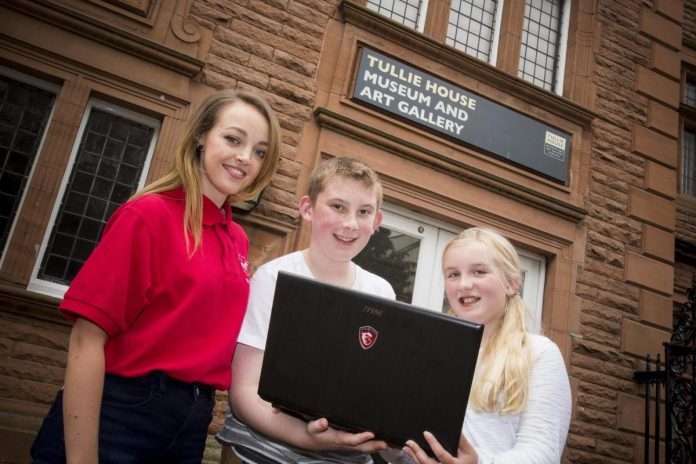AS we mark National Video Game Day, we’re looking back on our love of gaming, whether fun or educational.
The Make it with Minecraft exhibition at Rheged (Image: Stuart Walker)
Our main picture shows young Carlisle residents who, in 2015, learned how to code their own video games at Switched on Futures digital skills workshops.
During the sessions, which marked the availability of Virgin Media’s ultrafast services in Carlisle, they programmed digital robots, which they controlled using cameras built into Microsoft Kinect devices.
Mum Jo Turner and son Vinnie Turner, seven, at the Minecraft exhibition (Image: Stuart Walker)
Ellie-Mai, 10 said: “This was my first time coding but Scratch is pretty easy to use! I gave my robot brown/blonde hair similar to my own. When I’m older I plan to have my own beauty shop, so learning to code means I can create my own website.”
Luke Atkinson won a national Discovery Education competition for designing an app with a Christmas-themed game (Image: Milton Haworth)
Ellie-Mai’s mum, primary school teacher Michelle Little, said: “Other than teaching I also work with apprentices and know the difference that computer literacy can be to getting a job. I really encourage other parents to get their kids involved in these types of activities, since everything is going digital and it’s always great to be one step ahead.”
Funk-E O’s modern and retro computer games at Carlisle market (Image: Newsquest)
In 1958, a ping-pong-like game, called Tennis for Two, created by William Higinbotham, debuted on a large analogue computer at the Brookhaven National Laboratory, a research institute in New York.
Perfecting their air hockey computer game were Tyler Chambers and Andrew Roberts at the Geek Week event at Whitehaven School (Image: Newsquest)
In the 1970s, the Odyssey and Atari video game home consoles went on the market with new technology like joysticks and multi-cartridge games. The 1980s brought about even more interesting video games, such as Pac-Man, Super Mario Bros, Tetris and SimCity, most of which continue to be successful franchises today.
Caldew School year 11 pupils reached the finals of the BAFTA computer game awards with their dungeon adventure game ‘Delvinator’ (Image: Newsquest)
While video games went through a bit of a slump in the mid-eighties, and several home computer and video game console companies even went bankrupt during that time, the industry bounced back stronger than ever.
Gen2 apprentices made a car simulator for an Xbox 360 (Image: Newsquest)
The advent of the Nintendo Entertainment System by an almost 100-year-old Japanese game company prevented the making of cheap, poorly made games by imposing regulations on third-party games. This rebuilt the integrity of the video game industry.
Actors play on an Xbox in Warning! May Contain Scenes of a Teenage Nature at St Joseph’s School (Image: Newsquest)
Just a few years later, in 1989, Nintendo introduced its handheld devices. Game Boy, Game Boy Color, Nintendo DS and Nintendo 3DS continued to revolutionise the video game industry into the early 2000s.
